by Texas Homesteader~
Our ranch has many beautiful trees, but none that are also as functional as the Bois D’Arc tree. The wood from this tree is highly valued for it’s rot-resistant qualities. And many ranchers use logs cut from this tree in their fence lines and barn beams.
My favorite thing about it though is the beauty in the wood itself as it ages. Many people have asked me to share a post about these beautiful trees so I’m obliging today.
The tree itself makes a beautiful shade tree, with gently arching branches. I’m showing a picture of it below, just to the right of the too-cute-for-words Hereford calf. 😉
The shape of the tree is easier to see in the winter without the leaves. This spot in one of our pastures was apparently at one time a fence line as evidenced by the soldier-straight rows.
I love to daydream about the past history and layout of our homestead…
The tree will bloom tiny white fragrant blooms in the spring and then put on their fruit called ‘Horse Apples’.
These are not actual edible apples but some wild critters around the homestead will munch on them. They’re very solid and very heavy.
They start out green and gradually turn yellow by the time they drop from the tree in the fall. Some say there are insect repellent qualities to these horse apples. They are often cut in half and rolled under sheds, barns and homes to repel spiders and other insects.
As the wood ages, a very beautiful character forms in the wood itself.
I fell in love with this Bois D’Arc branch that apparently fell years ago and continues to amaze me with it’s beauty and detail even now.
And we took a very old Bois D’Arc post and made a gorgeous solar-light feature with it.
That Bois D’Arc light feature was gifted to our daughter and her new husband as a wedding gift. They absolutely loved it!
The real beauty in this tree for me is the fascinating characteristics of the wood.
My brother took this photo of a very, VERY old fence row of Bois D’Arc trees. What beautiful wood!
Master Naturalist P.K. Kirkpatrick shares this interesting information about Bois D’Arc trees:
The Bois D’arc tree has many common names including Osage Orange, horse apple, hedge apple and more. This is the tree that native Americans, especially the Osage Indians, preferred for their bows and arrows. This tree was described by French explorers as “Bois D’arc” which means bow wood. Different parts of this tree are used as insect repellant, leather tannin, fence posts, wheel rims, tool handles, etc. The list goes on and on, but the old barns and fences built using this wood are so sturdy, practical and lovely.
I guess we’re just really lucky to have so many of these wonderful trees growing here on the Homestead! I’ve written a more detailed Bois D’Arc Article if you’d like to check it out.
Do you have these gorgeous trees where you live?
~TxH~
Read About Bois d’Arc
- Bois d’Arc – Beautiful & Functional Tree
- Solar Light Feature Using Bois d’Arc
- Bois d’Arc Beauty
- Horse Apple Triplets
Native Trees & Plants
- Honey Locust Tree – Useless yet Useful
- Identifying A Western Soapberry Tree
- Bois d’Arc – Beautiful & Functional Tree
- Jujube Tree Produces Sweet Fruits
- Wild Plum Tree Offers Plums For Delicious Jelly
Other Native Wildlife Posts
- Trapping Wild Hogs
- Wild Hogs: Making The Best Of A Bad Situation
- Adding Temporary Protection For Wild Rabbit’s Nest
- Itchy Chiggers – Separating Fact From Fallacy
- Trapping And Relocating An Armadillo

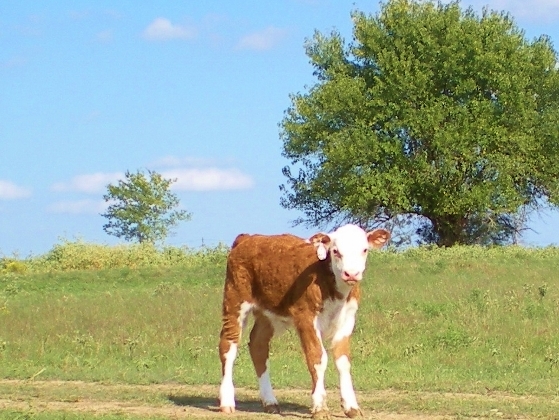
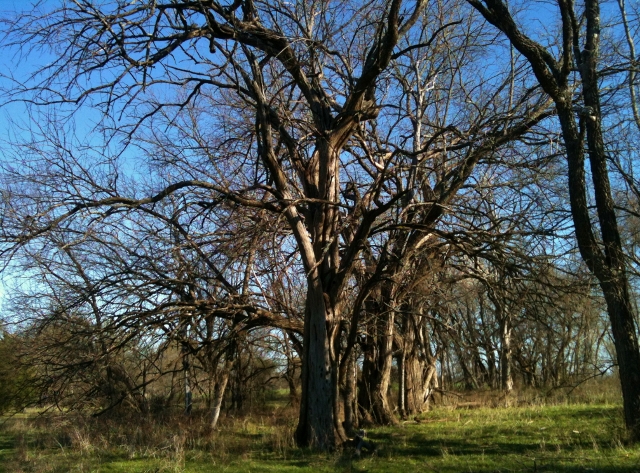
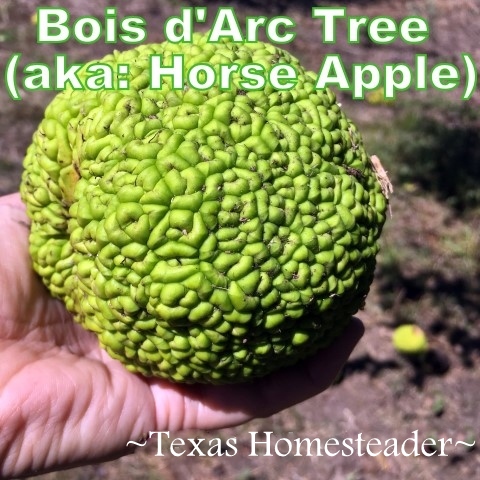
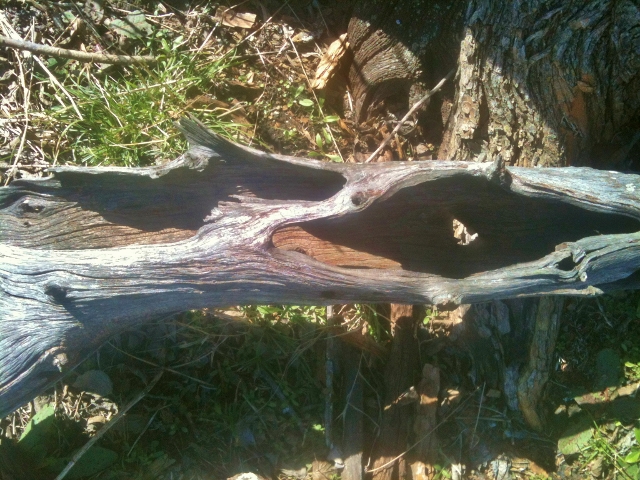
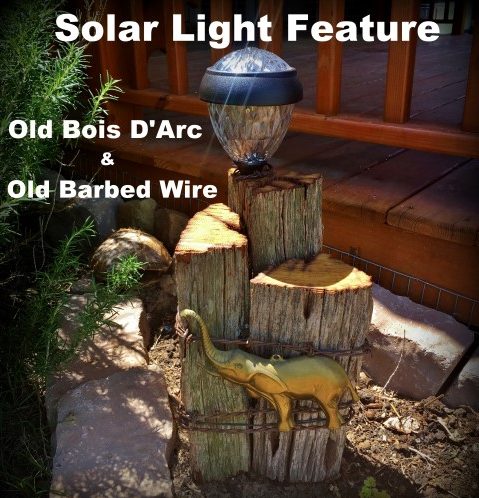
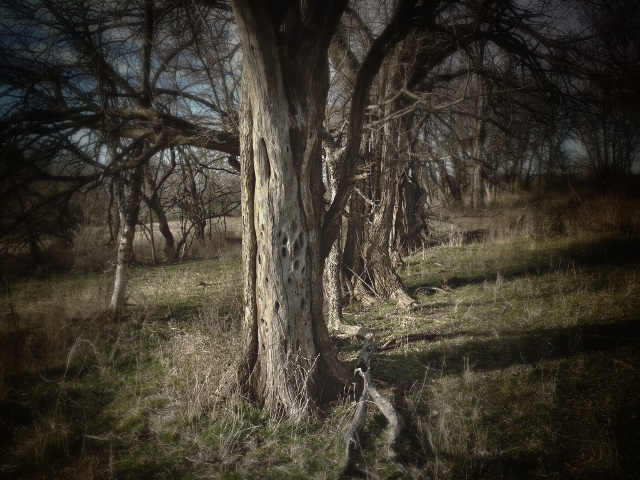
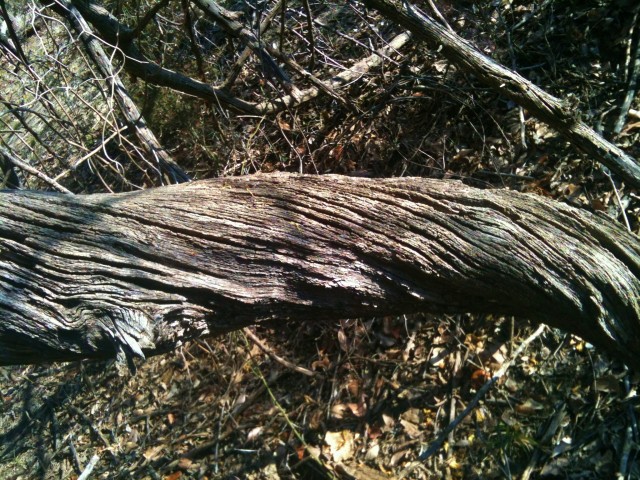

I love my horse apple tree.. are the horse apples seeds
I believe horseapples are the seeds Lisa. I understand they have to be overwintered or stratified to grow so not the easiest to start from seed. But such cool trees! ~TxH~
I remember playing with the horse apples while growing up… Then as I have aged, they disappeared from my world. I only recently was told that the wood on my 1935 home at the foundation level was made with Bois D’arc wood. The surveyor was so surprised and informed me that I could not have had a better, stronger and rot resistant protective wood of any kind. I was so excited to learn of my good fortune from so long ago.
sav
Our 1880’s barn also has Bois d’Arc posts. No wonder it’s stood the test of time! ~TxH~
Any advice on how to get rid of a dead one.
It’s roughly 18 inches in diameter and about 8 to 10 feet tall. Most of the limbs are gone and it’s been dead for several years.
We’ve cut Bois D’Arc trees down before, it’s pretty hard on a chainsaw but it can be done. ~TxH~
I live in Central Texas on 20 acres. We do not have any Bois D’arc trees around us or in our county. Many years ago, we passed a tree in a park that had the horse apples on the ground. We stopped and got a couple and took them to my mother-in-law’s. No one knew what it was, except for my MIL. I didn’t know the tree has thorns. My understanding is that they spread and become a pest tree. Around here, our pest tree is the mesquite tree. It, too, has thorns that will puncture your tires. I go around the property with an herbicide that will kill the young tree. However, the dead saplings still leave it’s thorns and must be cut and burned. I don’t know how mesquite briquets are made for the BBQ. Mesquite isn’t hard to cut.
I think the Bois D’Arc tree does spread and could technically become a pest tree I suppose, but in my opinion they’re not very aggressive in their spread. We’ve been able to easily control the spread into undesirable places and (again in my opinion) it wasn’t any different than the spread of any other tree which might pop up in an area we didn’t want them. ~TxH~
I am about to start building a house on a piece of property with a bois d’arc tree just a few feet from where I want to put the house. Could the root system of this tree cause a future foundation problem? I really hate to cut down such a grand old looking tree, thorns and all, but I can’t put the house at risk in order to keep it. Should I have it removed?
Ya know, Mark – I really have no idea. Our house is apparently planted at the Botanical Hole of Death. Although many trees are on our property, no trees are near our house. I have noticed the Bois d’Arc trees in the pastures & creeks don’t appear to have top-running roots. But a better source for your answers would be an arborist or you extension agent. You’re right though, they are beautiful trees. (especially the really old ones) ~TxH~
I’m a native Texas, but I guess I never paid a lot of attention to trees when I was younger. Our last house had a creek behind it, and there was a large tree with one dead branch that overhung our back fence. I was always afraid it would break off and ruin the fence, so one day I decided to cut it off. The first thing I noticed was the thorns, which I avoided, but when I tried to cut it – wow… I dulled my chain saw blade so I got my bow saw and proceeded to dull it as well. After quite a while, and only making about an inch of progress, I decided that the limb would probably not just break off on its own. That was about 15 years ago, and I would be willing to bet that it is still there.
OMGosh Dustin, I hear ya! When we first bought this property we were clearing a fenceline that was overgrown with Bois D’Arc trees. Naively we went to cutting them down away from the fence, only to find we were dulling the blade oh-so-quickly. It didn’t take long before we decided to only trim the branches that were impacting the actual fenceline and to leave the rest of the tree alone. LOL. I love them, they’re beautiful, but dang they’re hard to cut! ~TxH~
Years ago I once read that the settlers used these trees as “shrub” fences because they grew to become horse high and hog tight.
Yes I believe you’re right, Glenn. Bois d’Arc are hardy and handy trees, that’s for sure. ~TxH~
I grew up on 10 acres in Houston in the 40’s & 50’s, where I would play with friends among the roots of a row of “horse apple” trees along our back property line. I loved those trees, from the papery thin root covering and the underneath orange colors to the crazy, lime-green, “horse apples”. We would dig caves into the roots, which were on a linear mound of dirt, and throw the horse apples to see them explode.
We moved when my dad subdivided the property when I was 13, but I took with me fond childhood memories.
I have lived in California since 1969, so forgot about the trees until I was in Beaune, France in 2010, and came upon a great towering specimen of a Bois d’arc tree in a park. The tree was especially striking because it was in Fall color and the sun was shining through the canopy of golden yellow and green leaves. My wife thought I was crazy while I searched around in the fallen leaves for the “apples”, finally finding several which I took photos of to remember a happy time as a child.
I grew up with a Bodark tree in our yard that grew on the banks of a creek in Austin. It was an amazing influence in my life….and if you have children or grandchildren you might be depriving them to cut it! The way that this tree grew it formed arched branches that created a cubby hole area to play, and later read or study inside. It was a living cave of gorgeous green leaves that was natural air conditioning in our hot summers! The biggest thing was…the tree taught Respect! With its long Thorns! Something hard to teach in our modern world! I Loved that Tree! When the city decided to make a drainage ditch out of the creek they were going to destroy the tree. My Dad cut it down in a careful way and carved the Most Beautiful Stallion out of it!! It stood over 3feet high and was the head and neck of a wild stallion….Gorgeous out of the Golden colored wood! The head has been copied and copied! I bought a copy in a Resort gift shop, and sent my Dad catalogs with replicas. He gave the
Beautiful head to the Blind School in Austin where it probably still gives the blind children a picture of Wild Freedom they could never experience…I Miss it but I know he was right to gift it! Respect these Beautiful trees…they should be preserved anywhere they are found…..they are a rare treasure ! In Many Many ways!
I have always wondered why Bois d’arcs, with their rot resistant wood, almost always have a lot of hollow branches. Seems they rot quite a bit while on the tree. Any input on this?
I’m not an arborist nor a master naturalist Dave, perhaps someone out there with more training can answer Dave’s question? I will say that I’ve seen precious few hollow branches on our trees here. The only hollowed areas I’ve ever noticed are for trees dead for years & years. Instead of just rotting out like normal wood they rot in ribbon-shaped areas. But we have Bois D’Arc posts in our fencelines that are decades old and even though they’re out in the weather year after year, they’re as strong as ever.
I live in NE Texas also. Dodd City to be exact. There is a house next door that has been condemned. It has a bois d’arc tree in the yard that is very odd in shape. The main trunk is only about 8-9 feet tall but is 14′ in circumference and 6 feet in diameter. Just huge. It is a no apple tree. It is of no use where it is for shade or anything because of its odd shape. I would love to make some table tops out of the trunk but have no idea how to cut it.
OMGosh that sounds like an absolutely beautiful old tree, it would be great to be able to do something with it Brian. If it’s as old as you say I’m sure cutting it would be a real challenge. Bois D’Arc trees are solid enough by themselves, add many years of growth and you’ve got a real dilemma. Hopefully you’ll be able to do something with it, maybe hire a tree company to come cut slabs for you? They would have industrial equipment. Just a thought.
Osage Orange- with many common names including bois d’arc tree or bodark, and bodock all of which either translate or are derived from the French term meaning “Bow Wood”. Given to the tree because of the native Americans and later Europeans use of the wood to make longbows.
We have Bois D’Arc trees here in Georgia. settlers in 1700’s and 1800’s used the wood for pegs in post and beam hand hewn houses. My house is all “fat lighter” or heart pine with Beau D’Arc pegs.
We I was a little tike in the 50’s we would pick up the brain fruit and roll them under the wheels of passing transfer trucks to smear yellow streaks down the highway. The trees were removed after the plantation house was moved to a high rent neighborhood, and the lot became a furniture store. What a loss of beautiful trees!
I just moved to Rowlett, TX from CA and cut a 20yr old one down from my front yard in a tract home neighborhood. It’s was a very scary looking tree. Found out it was a Bodart after the fact. Not a good tree for a small yard with all the surface roots. Interesting species of wood, learned all about from goog.. and this blog. I’ll be saving some of the wood to burn for camp outs and to make some walking sticks.
Interesting Juliet, Bois D’Arc aren’t usually a variety of tree planted in tract home neighborhoods, especially since they have thorns on their branches. Most homeowners shun trees planted that close to their home that have thorns. And 20 year old one? Wow, wonder how many saw blades they had to go through to get through that trunk – Bois D’Arc is hard and super-sappy drippy wood! I don’t envy the poor soul stuck working in such a confined place with such a large Bois D’Arc! I love ’em, but I wouldn’t want them that close to my home either so I don’t blame you at all…
Thanks, I’ll keep looking. The key is to cut it green, but it still gums things up! My friend David has made great walking sticks out of bois d arc fence pickets from pre civil war fences I procured from a farm near Whitewright. He uses a draw knife to shape and smooth, and seals with Tung oil. A beautiful piece of history!
i live in whitewright and run a tree service. I take down probably 3 of these trees a year. I have two to take down in the next 2 weeks. I have had to put a lot of this log into the dump. Post if you have a REAL interest in the wood. Also, there are different types of this tree. And the thorn/no thorn and fruit/no fruit I think is because of male/female trees. It is strange to me that these are native trees to this area and grow prolifically here, but there is little real information around. Strangely enough, the Texas A&M University
Tree ID website lists the Pyrus calleryana (callery pear) as a close relative. but Callery Pear is another name for Bradford Pear. I think they have made a mistake here.
Ok, so I’m looking for bois d’arc fence posts to build traditional post and rail fences on my Oklahoma ranch. Any help finding a commercial source would be much appreciated. Incidentally, bois d’arc wood was the preferred wood in early propellers for fighter planes. It was the only wood that could take a bullet hit and not fragment. I’ve been told that Boy Scouts were used to locate these trees during wartime for this purpose. Thanks for this great blog!
Thank you for your kind words, Bob. What interesting facts too! I’m not aware of a commercial source for Bois D’Arc posts, most people around here harvest only enough large limbs to use for their own fences. I know from experience that it’s a whippin’ for your chainsaw when cutting these hardwood trees so maybe that’s why. RancherMan & I are in the process of harvesting some of the smaller limbs to make custom walking sticks from – I can’t wait to see how they turn out. Yep, Bois D’Arc trees are wonderful!
GREAT TREES and very useful……
However, I would like to get some of the ‘apples’???
Any idea where I might buy some near Dallas?
Thanks!
Eric
Be more than happy to have you harvest the apples from my boidarks. They are really loaded this year. I live near Kemp off 175 its close to 50 miles from dallas, according where you are in town. You can contact me @ 903-498-0101. for direcions
Have read. Texas banks back in the day only extend credit to homes built with Bodark post and beam foundations. Now local government/ municipality/ local building codes/ home owners associations would never allow Bodark foundation on new construction. In Collin County I was required to have engineered plan for foundation. Plans called for 110 belled piers drilled from 17-22 foot or bedrock. Then a post tension concrete slab to float on top of piers. Well made it five years before engineered foundation failed to the point of needing repair. Funny though we can drive out my ranch in Hopkins county and look at century old structures straight as can be! My ranch entrance is built solely out of Bodark and quite unique. Right now I probably have 500-1000 staves and 200-300 fence post all cut from Bodark. Grew up in the Mesquite and Cedar brush of South Texas but now have a place where some timber still exist. Bodark in my opinion is the best wood in Texas with White Oak as my second favorite. Thank the good Lord I was born in Texas.
cLd
I love your story – and you’re absolutely right, I certainly don’t think our building codes have improved foundations over the years. My mother lives in a home built back in 1875 on bois d’arc posts! They sure don’t make ’em like they used to. I’m so thankful we have so many interesting bois d’arc trees here.
Hawdy
Grew up 60 miles south east of KC MO just off 50 …
now in Pueblo CO on 50 how strange …
love the tooth picks from the horse hedge ha ha
am looking for just a hand-full of limbs
would love to have a load of all u have but … 🙂
I wish to make a for fence and stuff someday on my own place
-bow & staff 5’9 ft +, walking stick and a few at least 1 wand 13 + inches
-but want to gift 7 + handfull of wands if u have any ..
so old snarled
– how much would u want for them ?
or also if anyone knows where to find a couple foot tall saplings ?
and
-could you ship them to me or 719-544-6969
unless you are just happening to make a jaunt up to the middle of Colorado ???
i could always move that way and ride the fences and count cows ..
i do have some ranch hand experience been some year ago now … 🙂
and do love this blog …
Thanxz for any help or info
ya’all have a Great Turkey Day
ps
I do want to work the wood my self thanxz 🙂
When I was a kid many years ago in North East Texas we used this wood for fence post.
I grew up in Tuscumbia, Ala. and we had a bois darc tree in our yard. My family still owns this property. This tree is the most interesting and beautiful tree I have ever seen! This tree has been used as a back drop in so many pictures. I grew up with this tree from the age of five. I am now 72 and the tree is still stunning! I love this tree! I feel like my life is told in this tree.
Hi–I just now discovered your blog while searching for something else, and had to stop in for a look. Last year I moved out to my family’s old ranching property in northeast Texas after many years in Houston and Dallas. I grew up here, and I know all about bois d’arc trees.
Good luck if you ever have to chop one down. The wood is truly as hard as steel, and. an ax hardly makes a dent in it. I remember my dad spent several days trying to fell a bois d’arc when I was a kid. I don’t how they split the wood into fence posts. Maybe that’s one reason that local sawmills were more prevalent in years past .
You noted that bois d’arc timber was used in barn construction. You may not know that just about every house around here built before concrete foundations became the norm, including mine, sits on a foundation of bois d’arc tree trunks. The trunks were sawed into equal lengths of 2 to 3 feet and stood on end. The wood is strong enough to support even very large two-story homes. My house is almost 100 years old and still sturdy.
Another use discovered by the early settlers, who may have learned it from the native American population, was as a dye. When freshly cut, the wood is bright yellow. A few wood chips thrown into a washpot of boiling water will dye any fabric yellow.
Have you noticed that some bois d’arcs produce horse apples, and some don’t? That’s because male and female flowers are produced on separate trees, with only the female . It is the female that bears fruit.
Yes, I certainly love Bois d’Arc trees for many reasons. Around here they don’t typically split the logs for fence posts, they usually just cut them to length and drop them as posts into the ground. We have several on our property and the thorns make us want to keep them cut high so we can mow under them but as you mentioned, even cutting the smaller branches can be a task. We’ve only cut them with the chainsaw, I certainly wouldn’t want to try to cut one down with an ax – that really WOULD be a chore! Even with the chainsaw, the Bois d’Arc has so much thick white sap that it stickies-up the chain over time. The white sap will literally drip from the cut log. Very interesting and useful tree, this Bois d’Arc.
I loved this post and just ran across another post in my email tonight from Granny Miller about Osage Orange trees and as I scrolled down I saw this beautiful fruit and remembered your post. If we have them in NC whether they be called Bois D’Arc trees or Osage Orange trees, I have never seen them. Texas and Pennsylvania….probably in NC too, sure wish we had some of them around our house!
I grew up in Arkansas and riding my horse to take cows to pasture, I stopped at many a ‘horse apple tree’! I am currently looking for some apples for insect repellant purposes for a family member with allergies to chemical repellants. Haven’t found any yet in Dallas County.
I am a native Texan (hill country between Wimberley and Blanco), and just found out about these trees last year! They are beautiful, but I didn’t know that about their wood – something to remember! I had to comment when I saw Roger’s comment about being from near Honey Grove – my sister and brother-in-law moved to Honey Grove last year (they were closer to Bonham) – it’s such a small world! Good luck with the ranch this summer – I hope we all get good rains!
Patty
I love these trees! We have some on the property we own – and formerly lived on. They are called Osage Orange around here too. My boys loved using the fruits as balls! :0 I miss those grand trees.!
TALU 🙂
We call them Osage Orange, too. According to the new book Plowing with Pigs, they can also be trained when young into a living fence. Love your photos. Thanks for sharing with us at the HomeAcre Hop. Come back this week
I never knew this about the Bois D’arc…(that they were good for posts and beams) We’ve actually burned some of this in our stove and it burns long and hot!
I use the horse apples on the porches and under the porches and around the underpinning of the house too.
The kids used them the year they made a potato gun and I wouldn’t ante up the the potatoes. Horse Apples travel pretty far when projected out of a pvc cannon!
The wood is hard…and pretty the way it twists and turns.
I have enjoyed practicing my camera skills on our mystical looking tree. We actually have a couple on our property.
thanks for posting this information, came here via FFBH , Pat
This is probably an old blog, but remember growing up south of Greenville,Tx and while out hunting in the woods I came across a small family burial plot. I noticed the the headstones had a date if 1852, and there next to it was a boi d arc burial marker, you can tell by the wood was splitting thru the years but I suspect the wood was as old as the others with stone.
I grew up north of Honey Grove and remember these trees. When the wood from this dries out it is a very hard wood. Many people have never heard of these trees.
I was surprised too Roger when I got so many comments asking about these beautiful trees – I just assumed everyone had them. The wood is so valuable on the ranch for fence posts and barn beams and poles. It lasts forever! (by the way, I love the town of Honey Grove – there are so many great people there!) Thanks for stopping by. ~TxH~